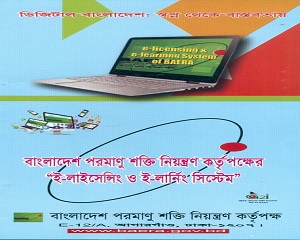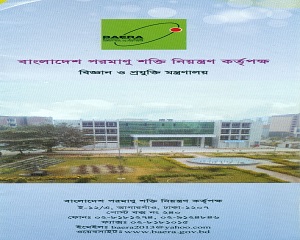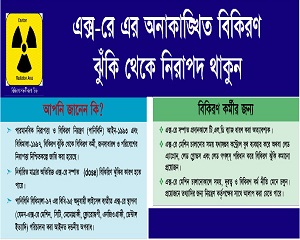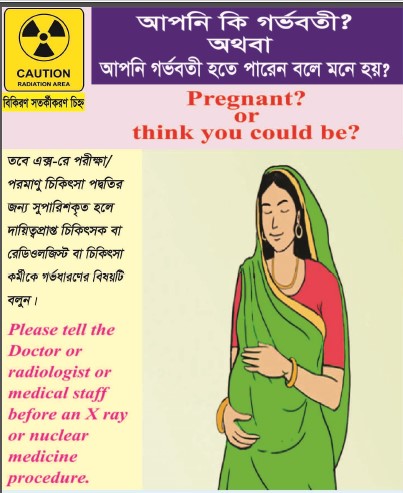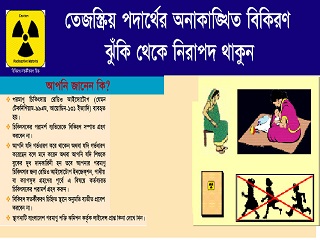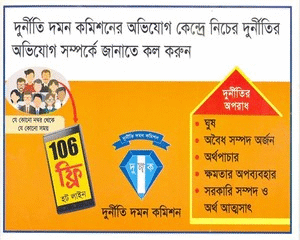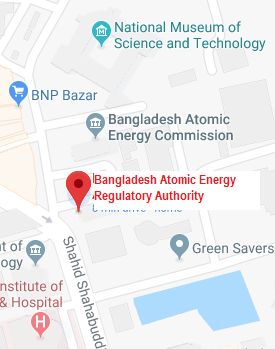"Radioactive Source Security: Present and Future Development" শীর্ষক সেমিনার অনুষ্ঠিত, ১৩ই এপ্রিল ২০১৭, অথরিটি ভবন, ঢাকা
১৩ এপ্রিল ২০১৭ খ্রি. তারিখে বাংলাদেশ পরমাণু শক্তি নিয়ন্ত্রণ কর্তৃপক্ষ (বাপশনিক) এর বিকিরণ নিয়ন্ত্রণ বিভাগের উর্ধ্বতন বৈজ্ঞানিক কর্মকর্তা জনাব শফিকুল ইসলাম ফয়সল “Radioactive Source Security: Present and Future Development” শীর্ষক একটি সেমিনার প্রদান করেন। উক্ত সেমিনারে প্রধান অতিথি হিসেবে উপস্থিত ছিলেন কর্তৃপক্ষের চেয়ারম্যান প্রফেসর ড. নঈম চৌধুরী, বিশেষ অতিথি হিসেবে উপস্থিত ছিলেন সদস্য প্রফেসর ডাঃ সাহানা আফরোজ এবং সদস্য প্রকৌশলী কাজী ওবায়দুল আওয়াল। বিকিরণ নিয়ন্ত্রণ বিভাগের পরিচালক ড. মোঃ মোফাজ্জল হায়দার সেমিনারটি পরিচালনা করেন। সেমিনারে অন্যান্য পরিচালকবৃন্দ এবং বিভাগীয় বিজ্ঞানী ও প্রকৌশলীগণ উপস্থিত ছিলেন।
সেমিনারে আলোচিত বিষয়বস্তুর একটি সংক্ষিপ্ত বিবরণ নিম্নে উপস্থাপন করা হলোঃ
Abstract of Seminar on “Radioactive Source Security: Present and Future Development”
A variety of high activity sealed radioactive sources are used in medical, research, industrial process and commercial purposes. Vulnerability during source movements and the potential for malicious acts making global threat for improvised explosive and radiological dispersal devices by theft and sabotage of radioactive materials. Thus it is very significant to protect these sources in a safe and secured manner. The relevant IAEA guidance and the functions that should be performed for physical protection systems including detection, delay, response, and their administrative measures as well as key security-related provisions of the Code of Conduct on the safety and security of radioactive sources were discussed in the seminar. An overview of Non-Isotopic Technologies were mentioned as substitutes for radioactive sources where appropriate. Non-isotopic alternatives are the radiation emitting devices that do not use high activity radioactive sources and currently available for a number of applications namely blood irradiation, radiotherapy, radiation processing etc. Countries have approached this issue in various ways such as through a justification principle, regulatory phase-out, government policy bans and commercially driven technology substitution. Technical and non-technical challenges in adopting alternative technologies were discussed. Source security status of different medical and industrial facilities in Bangladesh are maintained according to national and international standards and can be enhanced by introducing non-isotopic alternatives. At present the key challenges in Bangladesh for source security includes transportation of sources in industrial radiography and well logging practices. BAERA may seek cooperation from IAEA and different international organizations for upgrading their regulatory practices and developing security for mobile source transit.


.jpg)




